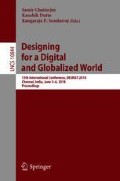Abstract
Healthy Eating is a two-part system that should strike a balance between food quality and food quantity. In this study, we have designed, developed, and evaluated a nutrition app called, Easy Nutrition to highlight the nutritional value/quality of the food we eat. We introduced the novel concept of Nuval rather than old concepts such as calorie counting. In this context, Easy Nutrition presents the food nutrition in a simple, easy to understand manner. Easy Nutrition also tackles the cultural differences by suggesting recipes tailored to users’ food preferences. This paper delineates the build and evaluate phase of Easy Nutrition. Easy Nutrition has been evaluated from a sociotechnical perspective in for its of utility and quality. We conducted a cross-sectional study on Amazon Mechanical Turk platform to evaluate Easy Nutrition on a wide population. The results show that Easy Nutrition demonstrates a fairly high level of usability (SUS = 69.1), attractiveness (mean = 1.59), and hedonic and pragmatic quality.
Access this chapter
Tax calculation will be finalised at checkout
Purchases are for personal use only
Notes
- 1.
The Intelligent Nutrition Engine is an algorithm developed by the authors and published before in the proceeding of AMIA 2017 [12].
References
Eisenberg, D.M., Burgess, J.D.: Nutrition education in an era of global obesity and diabetes: thinking outside the box. Acad. Med. 90(7), 854–860 (2015)
Ogden, C.L., Carroll, M.D., Fryar, C.D., Flegal, K.M.: Prevalence of obesity among adults and youth: United States, 2011–2014, November 2015. https://www.cdc.gov/nchs/data/databriefs/db219.pdf. Accessed 13 Dec 2016
Frieden, T.R., Rothwell, C.: Health, United States (2015)
American Diabetes Association: 2451 Crystal Drive, Statistics about diabetes. American Diabetes Association. http://www.diabetes.org/diabetes-basics/statistics/. Accessed 12 Dec 2016
Arens-Volland, A.G., Spassova, L., Bohn, T.: Promising approaches of computer-supported dietary assessment and management-current research status and available applications. Int. J. Med. Inf. 84(12), 997–1008 (2015)
Ma, Y., et al.: PDA-assisted low glycemic index dietary intervention for type II diabetes: a pilot study. Eur. J. Clin. Nutr. 60(10), 1235–1243 (2006)
Theng, Y.-L., Lee, J.W.Y., Patinadan, P.V., Foo, S.S.B.: The use of videogames, gamification, and virtual environments in the self-management of diabetes: a systematic review of evidence. Games Health J. 4(5), 352–361 (2015)
El-Gayar, O., Timsina, P., Nawar, N., Eid, W.: Mobile applications for diabetes self-management: status and potential. J. Diab. Sci. Technol. 7(1), 247–262 (2013)
Arsand, E., et al.: Mobile health applications to assist patients with diabetes: lessons learned and design implications. J. Diab. Sci. Technol. 6(5), 1197–1206 (2012)
Nuval System
ANDI Food Scores: Rating the Nutrient Density of Foods. https://www.drfuhrman.com/learn/library/articles/95/andi-food-scores-rating-the-nutrient-density-of-foods. Accessed 31 Oct 2016
Alrige, M., Chatterjee, S., Medina, E., Nuval, J.: Applying the concept of nutrient-profiling to promote healthy eating and raise individuals awareness of the nutritional quality of their food. In: proceeding of AMIA2017, Washington, DC (2017)
Epstein, L.H., Myers, M.D., Raynor, H.A., Saelens, B.E.: Treatment of pediatric obesity. http://www.ohsu.edu/xd/outreach/oregon-rural-health/hospitals/chip/upload/Treatment-of-Pediatric-Obesity.pdf. Accessed 09 Dec 2016
Valocki, A.: Nutrient intake of obese children in a family-based behavioral weight control program. Int. J. Obes. 14(8), 667–677 (1990)
Epstein, L.H., Wing, R.R., Koeske, R., Ossip, D., Beck, S.: A comparison of lifestyle change and programmed aerobic exercise on weight and fitness changes in obese children. Behav. Ther. 13(5), 651–665 (1982)
Epstein, L.H., Wing, R.R., Steranchak, L., Dickson, B., Michelson, J.: Comparison of family-based behavior modification and nutrition education for childhood obesity. J. Pediatr. Psychol. 5(1), 25–36 (1980)
Epstein, L.H., et al.: Effects of decreasing sedentary behavior and increasing activity on weight change in obese children. Health Psychol. 14(2), 109 (1995)
Epstein, L.H.: Child and parent weight loss in family-based behavior modification programs
Duffy, G., Spence, S.H.: The effectiveness of cognitive self-management as an adjunct to a behavioural intervention for childhood obesity: a research note - Google Search. J. Child Psychol. Psychiatry 34(6), 1043–1050 (1993)
Hevner, A., Chatterjee, S.: Design science research in information systems. In: Hevner, A., Chatterjee, S. (eds.) Design Research in Information Systems, vol. 22, pp. 9–22. Springer, Boston (2010)
Meth, H., Mueller, B., Maedche, A.: Designing a requirement mining system. J. Assoc. Inf. Syst. 16(9), 799 (2015)
Bader, A., Gougeon, R., Joseph, L., Da Costa, D., Dasgupta, K.: Nutritional education through internet-delivered menu plans among adults with type 2 diabetes mellitus: pilot study. JMIR Res. Protoc. 2(2), e41 (2013)
Evert, A.B., et al.: Nutrition therapy recommendations for the management of adults with diabetes. Diab. Care. 37(Supplement_1), S120–S143 (2014)
Walker, S.N., Sechrist, K.R., Pender, N.J.: The health-promoting lifestyle profile: development and psychometric characteristics. Nurs. Res. 36(2), 76 (1987)
Author information
Authors and Affiliations
Corresponding author
Editor information
Editors and Affiliations
Rights and permissions
Copyright information
© 2018 Springer International Publishing AG, part of Springer Nature
About this paper
Cite this paper
Alrige, M., Chatterjee, S. (2018). Easy Nutrition: A Customized Dietary App to Highlight the Food Nutritional Value. In: Chatterjee, S., Dutta, K., Sundarraj, R. (eds) Designing for a Digital and Globalized World. DESRIST 2018. Lecture Notes in Computer Science(), vol 10844. Springer, Cham. https://doi.org/10.1007/978-3-319-91800-6_9
Download citation
DOI: https://doi.org/10.1007/978-3-319-91800-6_9
Published:
Publisher Name: Springer, Cham
Print ISBN: 978-3-319-91799-3
Online ISBN: 978-3-319-91800-6
eBook Packages: Computer ScienceComputer Science (R0)

